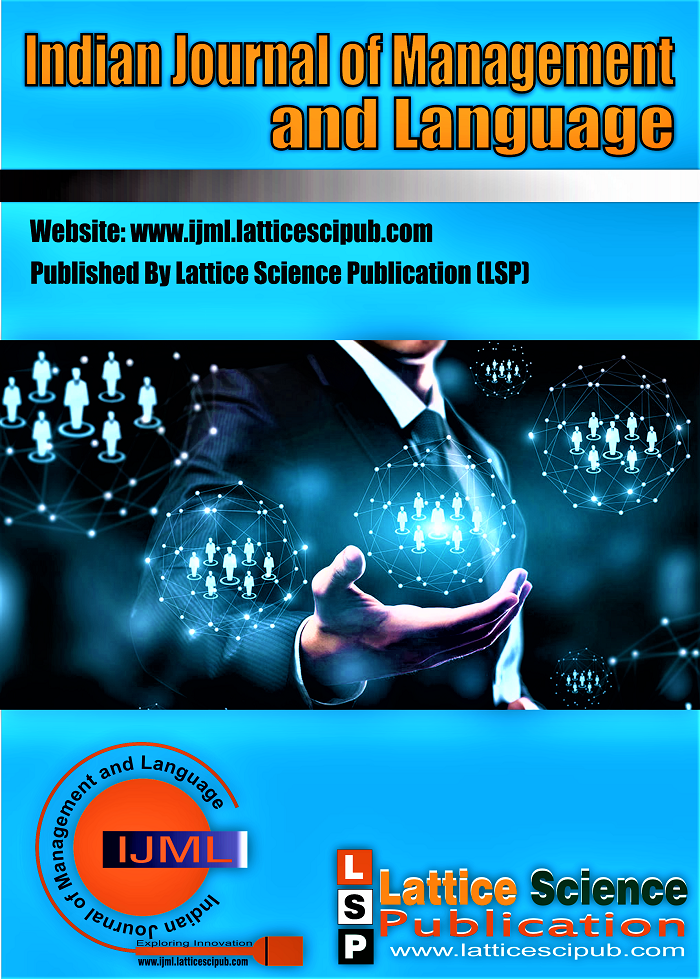Prospects for the Indian Affiliate Marketing Industry: Growth of Affiliate Programs and Channels
Main Article Content
Abstract
This paper discusses affiliate marketing, in which the seller or service provider is a rewarding and fulfilling agent so-called affiliate for each visitor, which through its way to attract a dealer there, who performed some action, either directly make purchases, register to subscribe to a newsletter, or simply browse the site. Affiliate marketing drives 16% of ecommerce sales in the U.S. and Canada. Amazon’s affiliate programme, Amazon Associates, has the greatest market share among affiliate networks (46.15 percent). Affiliate marketing is one of the most effective forms of digital advertising. Increasing Internet usage worldwide is propelling the affiliate marketing industry, particularly in India. Tata Strategic Management Group titled “Affiliate Marketing in India – The Next Frontier”. There are 75 highest-paying top affiliate programmes in India for 2020, organised by niche. Affiliate marketing involves three parties: the advertiser, the publisher, and the consumer. According to STATISTICA, 84 percent of U.S. Publishers and Advertisers use affiliate marketing. Adoptability and future potential of affiliate marketing in Indian enterprises is the focus of this study paper.
Downloads
Article Details

This work is licensed under a Creative Commons Attribution-NonCommercial-NoDerivatives 4.0 International License.
How to Cite
References
Akçura, M. T. (2010). Affiliated marketing. Information Systems and
E-Business Management, 8, 379–394.
https://doi.org/10.1007/s10257-009-0118-4 [CrossRef]
Angeloni, S., & Rossi, C. (2021). An analytical model for comparing
the profitability of competing online marketing channels: Search
engine marketing versus e-commerce marketplace. Journal of
Marketing Theory and Practice, 29, 534–549.
https://doi.org/10.1080/10696679.2021.1879656 [CrossRef]
Damnjanovic, V. (2020). Business Case of the Affiliate Marketing
Business Model. https://doi.org/10.4018/978-1-5225-8575-6.CH018
Daniele, R., Frew, A., Varini, K., & Magakian, A. (2009). Affiliate
Marketing in Travel and Tourism.
https://doi.org/10.1007/978-3-211-93971-0_29 [CrossRef]
Dwivedi, Y. K. (2017). Affiliate marketing: An overview and analysis
of emerging literature. The Marketing Review, 17, 33–50.
https://doi.org/10.1362/146934717X14909733966092 [CrossRef]
Edelman, B. L., & Brandi, W. (2015). Risk, Information, and
Incentives in Online Affiliate Marketing. Journal of Marketing
Research, 52, 1–12. https://doi.org/10.1509/jmr.13.0472 [CrossRef]
Haghirian, P., & Inoue, A. (2007). An advanced model of consumer
attitudes toward advertising on the mobile internet. Int. J. Mob.
Commun., 5, 48–67. https://doi.org/10.1504/IJMC.2007.011489
[CrossRef]
Haq, Z. (2012). Affiliate marketing programs: A study of consumer
attitude towards affiliate marketing programs among Indian users.
International Journal of Research, 1.
https://doi.org/10.5861/IJRSM.2012.V1I1.84 [CrossRef]
Hossan, F., & Ahammad, I. (2013). Affiliate Marketing: The Case of
Online Content Providers in Bangladesh.
https://www.semanticscholar.org/paper/4c8d994c87520c0b440468cb
cdbd4590c7663762
Ivkovic, M., & Milanov, D. (2010). Affiliate internet marketing:
Concept and application analysis. 2010 International Conference on
Education and Management Technology, 319–323.
https://doi.org/10.1109/ICEMT.2010.5657647 [CrossRef]
Jurišová, V. (2013). Affiliate marketing in the context of online
marketing. Review of Applied Socio-Economic Research, 5,
–111.
Kaur, J., & Wadera, D. (2018). Affiliate Marketing Strategy of
Amazon India. https://doi.org/10.4018/978-1-5225-2656-8.CH003
[CrossRef]
Libai, B., Biyalogorsky, E., & Gerstner, E. (2003). Setting Referral
Fees in Affiliate Marketing. Journal of Service Research, 5, 303–315.
https://doi.org/10.1177/1094670503005004003 [CrossRef]
Mican, D. (2008). Optimized advertising content delivery in affiliate
networks.
https://www.semanticscholar.org/paper/38c1d913b5f58a17eb1f2c27
a486c99a2ed46fb9
Mizuno, M. (2012). How Consumer-Generated Advertising Works:
An Empirical Agent-Based Simulation.
https://doi.org/10.1007/978-4-431-54847-8_2 [CrossRef]
Mohamed, H., & Fahmy, T. (2016). What Factors Influence
Consumers’ Trust in Travel Affiliate Websites? An Exploratory
Study. International Journal of Heritage, Tourism, and Hospitality, 7.
https://www.semanticscholar.org/paper/8526f1664bd604e492cacc38
ebf59f9604c1c4e
Narang, R., & Trivedi, P. (2018). Affiliate Marketing: Experiences of
Different Companies.
https://doi.org/10.4018/978-1-5225-2656-8.CH002 [CrossRef]
Natarina, R. A. E., & Bangun, C. R. A. (2019). The Use of Affiliate
Marketing in Improving Pegipegi Sales. Jurnal The Messenger.
https://doi.org/10.26623/THEMESSENGER.V11I2.1210 [CrossRef]
Norouzi, A. (2017a). AN INTEGRATED SURVEY IN AFFILIATE
MARKETING NETWORK.
https://doi.org/10.17261/PRESSACADEMIA.2017.604 [CrossRef]
Norouzi, A. (2017b). AN INTEGRATED SURVEY IN AFFILIATE
MARKETING NETWORK.
https://doi.org/10.17261/PRESSACADEMIA.2017.604 [CrossRef]
Patrick, Z., & Hee, O. C. (2019a). Factors Influencing the Intention to
Use Affiliate Marketing: A Conceptual Analysis. International
Journal of Academic Research in Business and Social Sciences.
https://doi.org/10.6007/IJARBSS/V9-I2/5608 [CrossRef]
Patrick, Z., & Hee, O. C. (2019b). Factors Influencing the Intention to
Use Affiliate Marketing: A Conceptual Analysis. International
Journal of Academic Research in Business and Social Sciences.
https://doi.org/10.6007/IJARBSS/V9-I2/5608 [CrossRef]
Prabhu, S., & Satpathy, T. (2015). Affiliate Marketing’s Future in
India. https://doi.org/10.17485/IJST/2015/V8IS4/62936 [CrossRef]
Scafarto, F., Cerruti, C., Binci, D., Ozeren, E., & Duygulu, E. (2017).
Entrepreneurial Intentions and Cultural Orientations. An Exploratory
Analysis in Italian and Turkish Universities.
https://doi.org/10.1007/978-3-319-54112-9_24 [CrossRef]
Shukla, P., Vyas, P. H., & Shastri, H. M. (2018). Investigating the
Mechanics of Affiliate Marketing Through Digital Content
Marketing: A Key for Driving Traffic and Customer Activity.
https://doi.org/10.4018/978-1-5225-2656-8.CH008 [CrossRef]
Slivar, I. (2008). Tourist Affiliate Program while Using Online
Booking System with Possibility of Entering B2B Code.
https://doi.org/10.5937/TURIZAM0812046S [CrossRef]
Suchada, J., Watanapa, B., Charoenkitkarn, N., & Chirapornchai, T.
(2018). Hotels and Resorts Rent Intention via Online Affiliate
Marketing. KnE Social Sciences, 3, 132–142.
https://doi.org/10.18502/KSS.V3I1.1402 [CrossRef]
Suresh, Vetriselvi, M., Maran, K., & Priya, A. (2018). A study on
impact of an affiliate marketing in e-business for consumers’
perspective. International Journal of Engineering and Technology, 10,
–475. https://doi.org/10.21817/ijet/2018/v10i2/181002050
[CrossRef]
Suryanarayana, S. A., Sarne, D., & Kraus, S. (2019). Information
disclosure and partner management in affiliate marketing.
Proceedings of the First International Conference on Distributed
Artificial Intelligence. https://doi.org/10.1145/3356464.3357703
[CrossRef]
Venugopal, K., Saumendra, D., & Nagaraju, M. (2013). Business
Made Easy By Affiliate Marketing. Journal Of Business Management
& Social Sciences Research, 2, 50–56.
Weijer, M. S. (2019). Providing Trust in Affiliate Marketing through
Blockchain Technology.
https://www.semanticscholar.org/paper/c6ddf9fc53bb694d2881722c
d6c72d971baddc4
e-References:
https://tren





